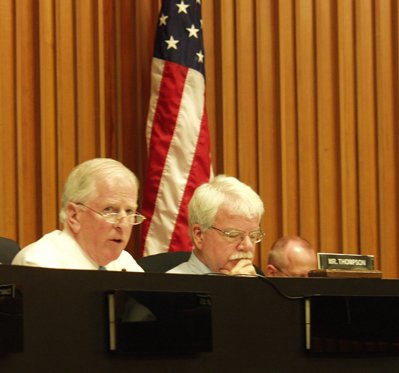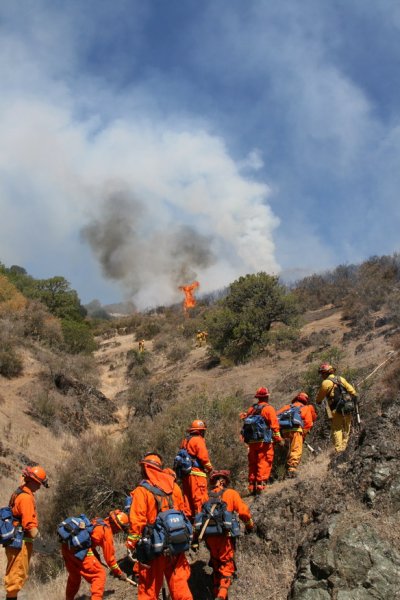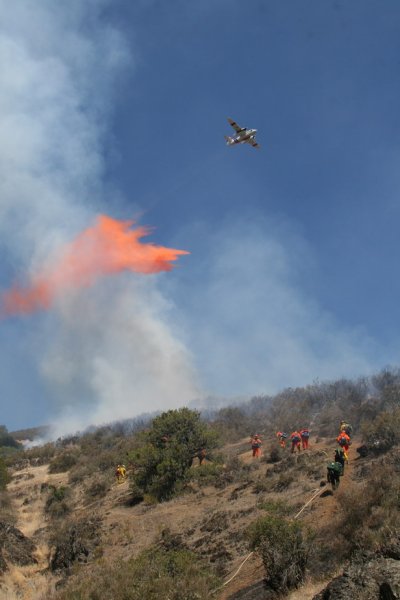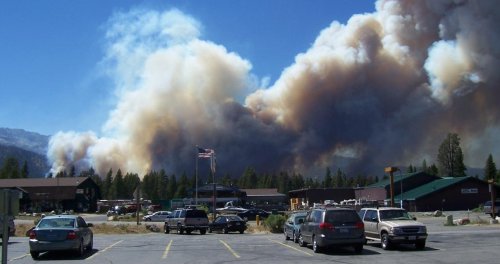
Congressman Mike Thompson (left) and George Miller at the Monday hearing in Vallejo. Photo by Elizabeth Larson.
VALLEJO – A U.S. Fish & Wildlife official told a congressional panel on Monday that an investigation is under way into whether a Department of Interior official used political influence to manipulate scientific evidence that forms the basis of the Bay-Delta's management.
Steve Thompson, manager of the U.S. Fish & Wildlife's California/Nevada Operations Office – which is part of the US Department of the Interior – gave that testimony during a hearing by the House Natural Resources Committee, Subcommittee on Water and Power.
During a question-and-answer session, Rep. Mike Thompson – who was invited to sit as a guest member of the subcommittee – asked Steve Thompson several pointed questions about political influence on the science used to make policy decisions regarding endangered species.
In the Bay-Delta, the delta smelt has become a focus of concern. Considered a species that is an indicator of the delta's overall health, during the past two years the smelt's population has begun to crash.
Thompson and 35 other members of Congress from California and Oregon last week called for hearings into Vice President Dick Cheney's part in an illegal water diversion that killed an estimated 70,000 salmon in the Klamath River.
Referencing the Klamath investigation, Mike Thompson asked Steve Thompson if his agency had been similarly pressured to change science based on politics.
The exchange went like this.
Mike Thompson: Have there been any communications between the White House and interior on the issue of science in the delta and water flows?
Steve Thompson: Between the White House and Interior? Not that I'm aware of.
Mike Thompson: That sounds like you're trying to split hairs. Has there been some political influence that has been focused towards you folks and what we should be doing there?
Steve Thompson: I get political influence from everyone, Congressman. If you're asking …
Mike Thompson: Steve, we go back a long time, OK?
Steve Thompson: Yes.
Mike Thompson: You know what I'm getting at, and you know what happened in the Klamath and you know the direct influence that the White house exerted in order to get their water policy put in place. Has there been anything similar to that in regard to the delta?
Steve Thompson: Not similar to Klamath but we have had interests from the assistant secretary's office on a regular basis on delta smelt.
Mike Thompson: And what sort of influence is that? Has there been a direction that they want, an outcome that they want to see and they're hoping to influence scientific decisions, or even, not just scientific maybe avoidance of the law as it pertains to the endangered species act?
Steve Thompson: That currently is under an active IG (Inspector General) investigation and it would be inappropriate to talk about it at this time.
Mike Thompson: I yield to Mr. Miller.
Rep. George Miller (also sitting on the committee): The assistant secretary there, you're referring to whom?
Steve Thompson: Deputy assistant secretary who is no longer there would be Julie MacDonald.
At that statement, an audible gasp rippled through the gallery of about 100 environmentalists, government officials, interested members of the public and media.
A Bush appointee, former Deputy Assistant Secretary of the Interior Julie MacDonald resigned April 30 after an Inspector General's investigation found that she had terrorized and bullied Fish & Wildlife staff, interfered with science and violated the Endangered Species Act, according to a report from the Center for Biological Diversity, which helped unearth some of MacDonald's activities.
A second Inspector General's investigation is under way into MacDonald's role in the delta, Steve Thompson said, a fact which prevented him from further discussing the matter.
Miller asked Steve Thompson how they could guarantee that more science wouldn't be compromised in favor of politics in the future.
Steve Thompson told the panel that he's working with his project leaders to identify areas of political interference, and had assured his staff that they can move ahead without fear of further political influence.
"This is exactly the type of situation we are trying to avoid," Congressman Thompson said after the hearing. "We learned the hard way how political manipulation can impact an ecosystem on the Klamath River; when politics trumped science and 80,000 salmon were killed, closing down the entire commercial salmon fishing season to California and Oregon last year."
Last month, eight members of Congress from the Bay Area – including Reps. Mike Thompson and George Miller (D-Martinez) – called for the hearing to explore issues with the Bay-Delta, which has become a crisis point in the state's water supply.
Subcommittee Chair Rep. Grace F. Napolitano (D-Norwalk) responded and in three weeks put together the hearing, which was titled "Extinction is not a Sustainable Water Policy: The Bay-Delta Crisis and the Implications for California Water Management."
Napolitano said no "colleagues from the minority" – i.e., the Republicans – participated in the hearing, despite her calls to Republican members. She said the Republicans aren't happy about the hearing, and said later in the meeting that they had accused her of holding a "dog and pony show."
"We were hoping they would be able to join us and work with us on this issue,” she said at the hearing's beginning.
What the Bay-Delta means to Lake County
In case you're wondering just what the Bay-Delta has to do with Lake County, you might be surprised to find out that it's actually closely linked.
The San Joaquin-Sacramento River Delta, also known as the Bay-Delta, is an expansive inland river delta in Northern California. It is formed at the western edge of the Central Valley by the Sacramento River at its confluence with the San Joaquin River just east of where the river enters Suisun Bay.
The Bay Delta is the largest estuary on the West Coast, covering 738,000 acres of land interlaced with hundreds of miles of waterways. Much of the land is below sea level and relies on more than 1,000 miles of levees for protection against flooding.
Clear Lake drains into Cache Creek. Both Cache and Putah creeks drain into the Yolo Bypass basin in the Sacramento Valley, which in turn drains into the Bay-Delta. A 2002 report on the Cache Creek Watershed states, “Mercury from Cache Creek Watershed appears to be a major source of mercury entering the Delta.”
The state's Department of Water Resources reports that 25 million Californians – from the south Bay Area to Southern California – get water from the Bay-Delta, for drinking water and other household uses, and for agriculture.
Since World War II, water exports from the Bay-Delta have continued to expand to meet the needs of California's growing population, said former state Assemblyman Phil Isenberg, who now chair's Gov. Arnold Schwarzenegger's Delta Vision Blue Ribbon Task Force, at the Monday hearing in Vallejo.
Water is exported from the Bay-Delta by the State Water Project, operated by the Department of Water Resources, and the Central Valley Project, operated by the federal Bureau of Reclamation.
Those projects' pumping stations have been held responsible by many environmental groups for the collapse of delta smelt populations.
The delta smelt is found only in the Bay-Delta. This spring, biologists began noting record low levels of juvenile smelt. Thousands have been killed in the pumps, which have led to lawsuits against both federal and state agencies.
On May 31, the Department of Water Resources shut down their pumping for a 10-day stretch because juvenile delta smelt coming into the delta for the first time were being killed in the pumps. The Bureau of Reclamation also curtailed pumping, although both have now returned to more normal pumping levels.
Of the original 29 indigenous fish species in the Bay-Delta, 12 have either been entirely eliminated or are currently threatened with extinction, according to a report by Congressman Mike Thompson's office. Once one of the most common and abundant of the pelagic, or oceanic, fishes in the delta, the delta smelt population is estimated to have declined approximately 90 percent in the last 20 years.
"If there really is an Inspector General's investigation going on, it calls into question the data being used for future delta management," said Thompson. "As a government, we need to work together to fix the Delta's deteriorating levees, recover its endangered species and provide safe drinking water.”
E-mail Elizabeth Larson at This email address is being protected from spambots. You need JavaScript enabled to view it..
{mos_sb_discuss:2}














